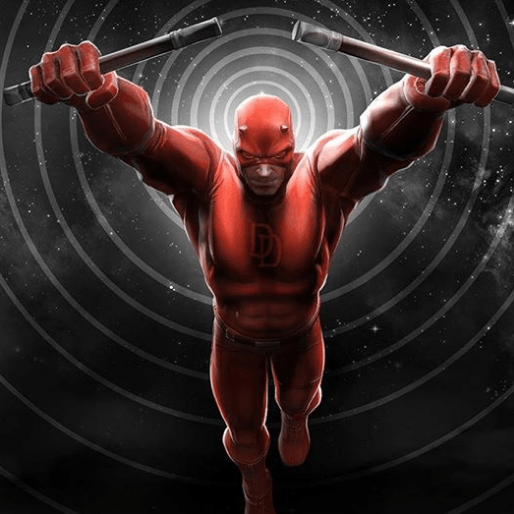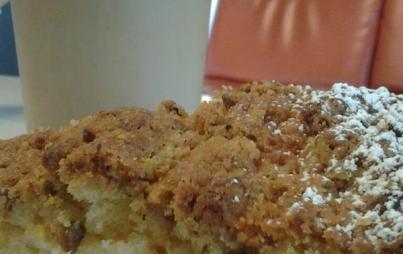
Banishing the baddies. Courtesy of Facebook
Heroes are more heroic when they're rescuing innocent women and children; guys aren't innocent and defenseless enough.
In the first big action set-piece of Netflix's much-acclaimed Daredevil series, our white hero rescues a number of white women kidnapped by a black guy and various henchmen. Daredevil is the white savior swooping down to do battle on behalf of exploited, hysterically screaming trafficking victims. After Daredevil thumps the bad guys, the victims remain so utterly paralyzed with terror that they can't even move when he tells them to find a cop. He eventually has to make a threatening gesture at them before they run off to the police, who, given how police tend to treat anyone associated with the sex trade, will probably arrest them, if they're lucky.
If they're not lucky, the police may sexually abuse them. But, hey, that's not Daredevil's problem. He rescued those in need of rescuing; that's what a hero does.
Daredevil is participating in a popular meme when he uses trafficking victims to prove his heroic bona fides. The new show 8 Minutes is organized around some guy heroically intervening to offer women a way out of the sex trade; Chris Hedges denounces trafficking in apocalyptic terms to show his brave defiance of capitalism; Nicholas Kristoff live tweets as he rides along on a Cambodian brothel raid, because the one thing Cambodian brothel workers need is to be part of a viral self-promotional initiative by a New York Times reporter.
But if Daredevil is following in the "heroic" footsteps of Kristoff and Hedges, he also shows how they're particular brand of heroism fits into broader cultural narratives about how heroism works, and who gets to be a hero. Daredevil is, like most superhero stories, all about saving people. It begins with rescuing trafficking victims, but every episode, more or less, features Daredevil rescuing the weak and defending the defenseless.
In the first few episodes of the series he rescues Karen Paige (Deborah Ann Woll) and Claire (Rosario Dawson) and a child, who has no role except to scream a bit and be rescued. He rescues men less frequently, and less enthusiastically; he does, for example, drag a Russian mob leader to safety, but mostly in the hopes of questioning him. Heroes are more heroic when they're rescuing innocent women and children; guys aren't innocent and defenseless enough.
Heroism, in other words, rests on disproportions of strength. The hero gets to be a hero not just by doing good, but by doing good and being relatively powerful. Heroes like Daredevil, or Nicholas Kristoff, seem like they're defending the weak. But in fact the stories they're in create and manufacture weakness expressly so the heroes can be heroes. Injustice is not a scourge to fight, but a precondition of genre pleasures. Schindler's List restages the Holocaust so Liam Neeson can be a hero; Amistad and Lincoln show you that slavery was actually a good thing because it allows you to recognize the shining virtue in men like Anthony Hopkins and Daniel Day Lewis.
This isn't to say that heroes are always powerful, exactly. In fact, Daredevil/Matt Murdock (played by the unmemorable Charlie Cox) is famously blind; he was injured as a child in a freak accident, and lost his sight while his other senses were enhanced. The series makes much of his tragic backstory; his accident, his father's tragic death, his abandonment by other father figures, and so forth. The subtext is that his own personal tragedies and pain have led him to identify with, and fight on behalf of, the weak.
"It hurts doesn't it. Being in pain, being afraid," he tells one random villain as he beats him to a pulp.
He's teaching the guy an object lesson—you do this to other people, how do you like it? But he's also clearly speaking from his own experience. I, Daredevil, did not like being in pain and being afraid, and I am no longer in pain and no longer afraid because I am big and strong and can hit you over and over. The hero saves those screaming, voiceless women not just to prove he's a hero but to prove that he's not those screaming, voiceless women. Daredevil isn't a slave, he's not a victim. He's a hero. He's got his name on the show and everything.
The line between hero and victim is a slippery one, though. Daredevil gets beaten and thumped and even saved himself. In fact, Rosario Dawson fishes him out of a dumpster and nurses him back to health while falling in love with him, saving him with romance, as women do in these narratives. Other "non-hero" people get to be heroes too; character-actor non-buff Foggy Nelson (Elden Henson) and Karen Paige get to rescue an elderly Hispanic woman; Foggy rescues Karen (though she gets to beat on the thugs too.)
Daredevil focuses on Daredevil's heroism, but what it really loves is the dynamics of heroism itself; the display of strength and violence in defense of, and as a way to distance oneself from weakness. The constant worries that Daredevil will go too far, that he will become the bullies he fights, are implicitly countered by his identification with the weak; the bad guys hurt those who aren't as strong, the good guys save them. How then could you tell the bad from the good without the weak? Absent the women huddled together screaming, what would be the point of all that creative choreography and awesome, gritty fisticuffs?
If trafficking victims and slaves and the oppressed didn't exist, we'd have to invent them. Superheroes love injustice; without it, all that fighting would start to look like plain old violence.






![By Magicland9 [CC BY-SA 3.0 (https://creativecommons.org/licenses/by-sa/3.0)], from Wikimedia Commons By Magicland9 [CC BY-SA 3.0 (https://creativecommons.org/licenses/by-sa/3.0)], from Wikimedia Commons](/sites/default/files/styles/profile/public/images/article/2019-06/Bell.png?itok=gWp6s_Y0)